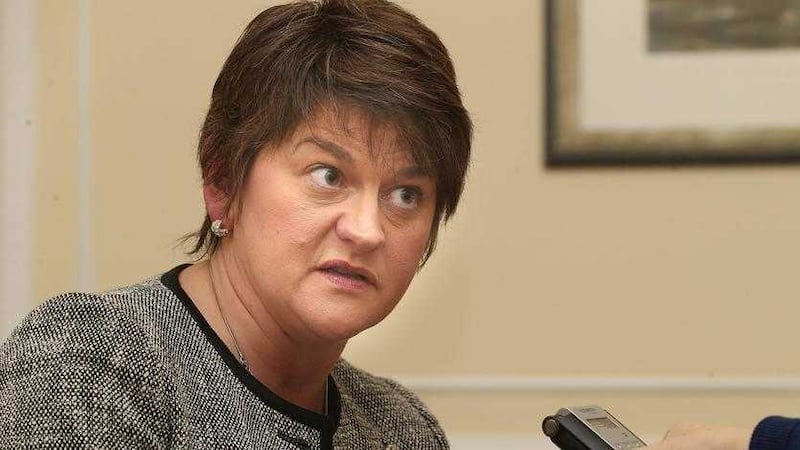Every unionist leader must deal with the clash between loyalist street politics and the rule of law - and thanks to the marching season, they can count on having to deal with it annually. Peter Robinson, who never cared much for the ‘loyal orders’, was adept at kicking this can down the road. His protégé Arlene Foster may hope to do the same. However, that in turn would clash with her carefully crafted image as an RUC man’s daughter. All these contradictions came into play this week at a parading dispute on Belfast’s Ormeau Road. Foster addressed them by giving bandsmen and the police an apparently equal hearing, which is not without electoral cost, if it was an electoral calculation. Most loyalists see the Ormeau incident as police attacking children but most unionists will just see thugs attacking the police, on the road and then online. In any case, far more clear-cut clashes are coming. Will the new first minister have to pick sides?
**
After reaction to the Ormeau Road got out of hand, Arlene Foster gave a BBC interview that seemed to soften her earlier stance. Taking an initial hardline position then moderating it was what she did over marking the Easter Rising, so perhaps this indicates her leadership style. Interestingly, UUP leader Mike Nesbitt takes the same approach to encircling the DUP, which he explains by the rugby analogy of ‘going wide’. If Foster does likewise, they will circle each other indefinitely.
**
There was more parading trouble at the start of the week as young people in paramilitary garb were inducted into a squalid culture of violence. Yes, it was Bangor’s pirate carnival again - fun for all the family, as long as your idea of fun is dodging mobs of paralytic teenagers as they swear, fight, throw up and pass out. We give youthful disturbances a great deal of political and sociological analysis in this part of the world but the parallels between Easter Monday in Bangor and Lurgan, for example, suggest such factors could be heavily discounted with more careful observation. To a large extent, public disorder in Northern Ireland is always a case of yo ho ho and a bottle of rum.
**
A dissident fancy dress parade in Coalisland - where do they get those jumpers? - has been used to launch a political party, or rather a “political vehicle”, as it was described from the podium by republican ex-prisoner David Jordan. This exciting new organisation should be anti-imperialist and anti-capitalist, of course, but also “anti-reform”, “beyond the influence of power and wealth” and so firmly abstentionist that “we should make it impossible [that it] should ever become a parliamentary party.” So it will be anti-party, hence why it is pro-vehicle. Onward to the Republic!
**
A surprise sour note on the centenary was struck by Irish president Michael D Higgins, who called on Britain to examine its “imperial triumphalism” with the same soul-searching zeal as Irish revisionist historians have examined the Easter Rising. As well as providing aid and comfort to the sort of idiots who still complain about imperialism, the president’s remarks were bizarrely misplaced. Embarrassment at empire has so defined British culture and politics for so long that any revisionism has to be pro-imperialist to go against orthodoxy. Recent high-profile attempts at this by the historian Niall Ferguson and the Conservative education secretary Michael Gove failed to find any popular support.
**
Bill Clinton has claimed Northern Ireland would be “whacked” if the UK left the EU, reportedly after Taoiseach Enda Kenny said Brexit could restart the Troubles. The risks of destabilisation must be considered but these warnings seem dangerously overblown in themselves. The peace process rests on international treaties between London and Dublin, underwritten by Washington. All our European safeguards on rights, culture and justice fall under the Council of Europe, not the European Union. The EU’s only role in the whole structure is providing two small funding streams via one of the six cross-border bodies, which answer to Belfast and Dublin. Even this could be partly preserved after Brexit, as EU border funding can be spent on its external border. Brexit poses many threats but a threat to peace should be least among them.
**
A tour guide has said he will not be “intimidated” for using a public path to the Giant’s Causeway. Jim Dickson, who runs Bespoke Tours Ireland, was taking a group of Australians along the public right of way, which bypasses the high-priced visitor centre, when he says two National Trust staff approached him to “log” his details. The National Trust has since described this as “on-site market research”. How the Australians will describe it to everyone back home can easily be imagined. The Giant’s Causeway is our most visited and iconic attraction. Trying to herd people through turnstiles (and car parks) in this manner must be doing real damage to Northern Ireland’s brand. Unambiguous signage past the National Trust’s money-making ventures should be an urgent priority for the Tourist Board and Causeway Coast and Glens Council.
newton@irishnews.com









